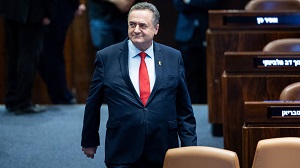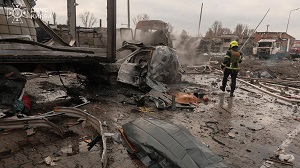Netanyahu’s wars: An escape from domestic crises - By Hasan Dajah, The Jordan Times
The course of events in Israel in recent years, particularly since October 7, demonstrates a close link between the military policies pursued by Benjamin Netanyahu’s government and the country’s internal crisis. The deep internal crisis, ranging from social and political divisions to Netanyahu’s ongoing corruption trial, is a central factor in understanding the government’s rush to escalate military operations and its attempt to present this escalation as an absolute security necessity. With the accumulation of political and military failures, Netanyahu’s tendency to use security and war as tools to reshape his image and divert attention from his personal and political crises is growing.
Since returning to power at the head of the most right-wing and extreme nationalist government in Israel’s history, Netanyahu has faced an unprecedented wave of popular protests. These protests were not only against plans to amend the judiciary but also reflected a deep crisis of confidence between broad segments of the Israeli population and their government. With these internal divisions erupting, Netanyahu found himself in a precarious political position, as his legal case transformed from a legal matter into a political crisis threatening his future. In such a charged atmosphere, any major security incident seemed poised to offer an opportunity to reshuffle the cards, making October 7 a pivotal moment.
The surprise attack on October 7 exposed an unprecedented weakness in the military and security institutions, whose strength Netanyahu had long boasted of maintaining. This resounding failure shattered the very narrative upon which he had built a significant portion of his political legacy: that of a "savior leader." With this image shaken, Netanyahu saw no alternative but to launch a large-scale military campaign, once again presenting himself as the only man capable of "restoring deterrence" and "protecting the nation." However, this campaign, rather than concealing the failures, often served as a stark reminder of them, especially given the government's failure to achieve its stated objectives to date and the growing international and domestic criticism of its handling of the war.
The connection between military attacks and the internal situation is not merely a political analysis; it has become a topic of discussion within Israel itself. A segment of the political and security elite believes that the government's continued expansion of military operations directly serves Netanyahu's need to remain in power for as long as possible.
As long as the war continues, with military strikes and assassinations in Gaza and Lebanon, as occurred two days ago, the Prime Minister can invoke national security to postpone internal debate about his responsibility for the failures before and during the war. Furthermore, the continuation of the armed confrontation provides him with political cover, shielding him from the immediate threat of the government's collapse, pressure to resign, or facing the investigative committees that will inevitably be formed.
These domestic considerations are not separate from Netanyahu and his partners' attempt to portray him as a "heroic savior." The government constantly tries to depict the war as a pivotal moment in Israel's history, one that necessitates national unity behind the leadership. However, this narrative clashes with the realities on the ground: the erosion of Israeli deterrence, the failure of intelligence agencies to provide early detection, the inability to end the war, and the decline in Israel's international standing, in addition to its international isolation. With all these factors, portraying Netanyahu as a leader with solutions becomes difficult unless the official narrative is sufficiently compelling to mask the contradictions.
The issue is not merely about Netanyahu's personal reputation, but about the very structure of the Israeli political system. Governments exploiting security crises is not new, but today it takes on a deeper dimension, given the sharp internal divisions that preceded the war. Opponents accuse Netanyahu of using the war to freeze discussions on judicial reforms and to silence the protests that paralyzed his government before October. Conversely, the right-wing base believes that the continuation of the war justifies the government's survival, and that changing leadership during the conflict could endanger national security. Caught between these two narratives, Netanyahu is successfully buying more time in office.
As the war nears its end, or even enters a less intense phase, the bigger question will resurface: Who bears responsibility for what has happened? Netanyahu understands that the answer could be devastating to his political image. Therefore, he clearly has an interest in prolonging the operations or at least keeping them in a state of "unfinished," so that the internal debate remains postponed. The longer Israel remains in a state of emergency, the easier it becomes for the government to deflect attention from structural failures, particularly those that reveal the supposedly robust defense Netanyahu claims to offer to be nothing but an illusion.
Israel’s ongoing aggression cannot be separated from the internal political crisis in Israel and from Netanyahu’s personal interests. The war, with all its consequences, has become an arena the prime minister uses to reshape his image and attempt to escape his most perilous political and legal predicament. But this path, however long it may last, does not negate the fact that Israeli society will sooner or later be forced to confront profound questions about leadership, legitimacy, and accountability, and then no heroic narrative will be able to conceal the truth.
HasanDajah is professor of strategic studies at Al-Hussein Bin Talal University
Latest News
-
 ‘Israel’ vows “no calm” in Lebanon
‘Israel’ vows “no calm” in Lebanon
-
 Safadi, German counterpart discuss bilateral relations, regional developments
Safadi, German counterpart discuss bilateral relations, regional developments
-
 Unstable weather brings rain, fog across Jordan on Tuesday
Unstable weather brings rain, fog across Jordan on Tuesday
-
 Ukraine, Russia trade deadly strikes as negotiators hammer at deal
Ukraine, Russia trade deadly strikes as negotiators hammer at deal
- UN seeks 'impartial' probe into Israeli strikes in Lebanon